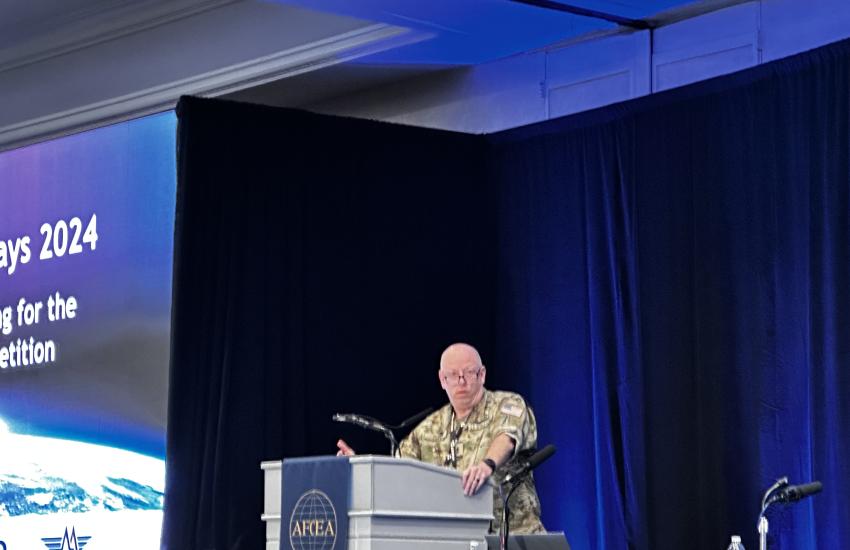Space Force Acquisition Must Be Effective, On Time and On Budget
U.S. Space Force acquisition is no longer going to put up with cost overruns and underperformance. The service must succeed in providing space operations to the joint force against a future lethal near-peer adversary, and it is enforcing accountability on industry contractors and its Space Force project managers (PMs) and program executive officers (PEOs), said Maj. Gen. Stephen Purdy, military deputy, Office of the Assistant Secretary of the Air Force for Space Acquisition and Integration.
Gen. Purdy, who is responsible for $24 billion in research and development efforts annually and represents Space Force positions to the Office of the Secretary of Defense, Congress and the White House, spoke at the Space System Command’s (SSC’s) Space Force Industry Days on Thursday.
“When you only have about $30 billion budget, which is roughly 10% of the other services, you are really limited in what you could do, especially when you have a joint emission set. So, this open discussion is important,” Gen. Purdy said.
The service has spent much of the last year focusing on the PMs and PEOs, making sure that they are performing effective program management, and going forward, it will do so with industry in terms of performance and cost.
The Space Force has already canceled programs—and will in the future—because of underperformance or cost overruns, Gen. Purdy warned.
“Over the previous year, we're now at 11 major acquisition programs that have been contracts or even the entire program restructured or canceled because of performance,” he said. “[The Assistant Secretary of the Air Force for Space Acquisition and Integration] Frank Calvelli has stated multiple times that we will no longer put up with continued bleeding. You will either live within your means, or we will cancel your program. It is a very rare day where we are going to go back and get more money than we used to in the past.”
It all comes down to basic program management. PMs should understand their technology, be clear on what the acquisition is and comprehend what is being developed and built. The managers should also reinforce the message to industry to bid only on what they can actually accomplish. PMs will also need to hold industry accountable, both from a bid perspective and an execution perspective, the general said.
Top leadership is also improving the execution reviews, the quarterly process where the service looks at how projects and contracts are managed. In fact, as part of the most recent execution reviews with PMs and PEOS, the head of the Space Force and the deputy, Chance Saltzman and Michael Guetlein, respectively, attended the reviews to increase accountability.
“We had the CSO [chief of space operations] himself, and we had the vice CSO personally involved, along with all the normal players,” Gen. Purdy said. “It happened over a multiday event, and we did it in person because we wanted to impress upon everybody the importance of good fiscal management and holding to your line. And so, they all got interrogated by the CSO himself and the vice. And we are going to continue doing that going forward, and we're going to grind even deeper in each one of our normal execution reviews to get down into the weeds.”
Moreover, technology managers also need to understand how the capabilities they are acquiring fit into the service’s larger picture as well as the greater U.S. Department of Defense.
“Our argument is you are no longer good to go,” Gen. Purdy offered. “You have to understand at a higher level, not only because you have to integrate into a bigger picture, but we also need you to now be thinking at a Space Force level and even at a joint level."

Adroit program management also means not rolling over larger amounts of money from projects.
“Limit your risk reserve, and limit your rollovers,” the general continued. “We are going to try to play a much thinner game. And we cannot mortgage our future by going in and trying to get more money for programs.”
In addition, the Space Force is looking at how to leverage private capital and is working more with the venture capitalist community, Gen. Purdy said. Investors are also a great source of research into prospective companies and financial analytics.
“Last week, I accompanied the vice CSO up to New York where we visited a bunch of VCs [venture capitalists] in a roundtable activity,” the general shared. “That is a culmination of a couple years of work with our SSC Front Door organization. And we had a lot to talk about. We will continue that work with VC community to inform them of where we want investments and where we think we need to go.”
Lastly, Gen. Purdy urged managers to understand their supply chain and identify any vulnerabilities from suppliers way down the chain.
“I remain committed to addressing supply chain vulnerabilities,” he said. “I fear that many times this is something that we think depends on other people, like, ‘It is the contracting office’s job or someone else's job or activity,’ ... blah, blah, blah, and you just close your eyes to what is going on. But do you even know that a problem exists in your supply chain domain? So, to the PMs and the industry partners, I would suggest you get into a much more proactive mode on that, because vulnerabilities are out there.




Comments